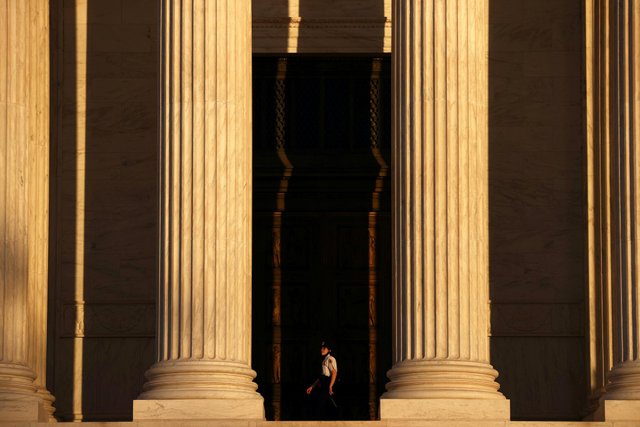
(Reuters) - An extraordinary attempt by the state of Texas to have President Donald Trump’s election loss upended by the U.S. Supreme Court is almost certain to fail, according to election law experts who called the lawsuit “absurd” and “laughable.”
site: https://sepa.host.dartmouth.edu/forum/profile/123movies-watch-safety-2020-full-online-free/
Republican-governed Texas on Tuesday sued Georgia, Michigan, Pennsylvania and Wisconsin in a case brought directly to the high court that asked the nine justices to throw out the voting results in the four election battleground states. Trump won in all four states in the 2016 election but was beaten in each of them by President-elect Joe Biden in the Nov. 3 election.
site: https://sepa.host.dartmouth.edu/forum/profile/123movies-watch-knuckledust-2020-full-online-free/
Rebecca Green, a professor at William & Mary Law School in Virginia, said Texas did not have legal standing to challenge how other states handled the election.
site: https://sepa.host.dartmouth.edu/forum/profile/watch-demon-slayer-movie-mugen-train/
“It is so outlandish. It is totally contrary to how our Constitution mandates that elections be run,” Green said. “The idea that a state could complain about another state’s processes is just absurd.”
site: https://sepa.host.dartmouth.edu/forum/profile/watch-demon-slayer-the-movie-mugen-train-2020/
The lawsuit is being spearheaded by Texas Attorney General Ken Paxton, a Republican and Trump ally. The lawsuit argued that changes made by the four states to voting procedures amid the coronavirus pandemic to expand mail-in voting were unlawful.
site: https://sepa.host.dartmouth.edu/forum/profile/123movies-watch-demon-slayer-kimetsu-no-yaiba-2020/
Texas asked the justices to immediately block the four states from using the voting results to appoint presidential electors to the Electoral College, essentially erasing the will of millions of voters.
site: https://www.peeranswer.com/question/5fd12c2db659091425963e32
Biden has amassed 306 electoral votes - exceeding the necessary 270 - compared to Trump’s 232 in the state-by-state Electoral College that determines the election’s outcome. The four states contribute a combined 62 electoral votes to Biden’s total. Texas asked the justices to delay the Dec. 14 date for Electoral College votes to be cast, a date set by law in 1887.
site: https://newssubmit.tumblr.com/post/637056610709159936/asdawdawda
‘THE BIG ONE’
The Texas case represents the latest in a series of long-shot lawsuits brought by the Republican president’s campaign and supporters to try to reverse his loss to Biden, who is due to take office on Jan. 20. Trump on Wednesday called the Texas case “the big one” and vowed to intervene in it, though he did not make clear whether it would be his campaign or the U.S. Justice Department taking action.
site: https://paiza.io/projects/3DCpSV-sbHkI3kfuN0TlEg?language=php
A filing at the high court like Paxton’s would usually be made by the solicitor general of Texas, Kyle Hawkins, the state’s top appellate lawyer, and not the state’s attorney general, but Hawkins did not sign on.
site: https://onlinegdb.com/rJTb13AoD
The reason for that is unclear, “but it’s possible it’s because he didn’t want to put his name on a legal filing that’s little more than a press release,” said Justin Levitt, a professor of election law at Loyola Law School in California.
Hawkins did not immediately respond to an email seeking comment.
Paxton filed the case directly with the Supreme Court rather than with a lower court, as is permitted for certain litigation between states, invoking a legal doctrine called “original jurisdiction.” Officials from Georgia, Michigan, Pennsylvania and Wisconsin called the lawsuit a reckless attack on democracy.
Green said that other potential litigants were better positioned to raise Paxton’s arguments in courts around the country, and “we have already been watching those challenges unfold.”
The Supreme Court’s 6-3 conservative majority includes three justices appointed by Trump.
Jonathan Adler, a professor at Case Western Reserve University School of Law in Ohio, said some of the conservative justices may vote to consider the lawsuit’s arguments on the grounds that they need to hear “original jurisdiction” cases. But even those justices are still very unlikely to go along with Paxton’s effort to upend the election, Adler added.
“My view is that the justices would be very, wary of opening that can of worms,” Adler said.
Adler said it is possible that Paxton brought the case in the hopes of getting a presidential pardon from Trump. Paxton faces allegations in Texas of bribery and abuse of his office to benefit a political donor, according to local media.
“It is fairly clear that one way you get a pardon is you rally to the president’s defense,” Adler said.
A spokeswoman for Paxton, who has denied wrongdoing, did not immediately respond to a request for comment.
Even if Paxton had made well-founded arguments, the remedy he requested from the justices is unrealistic, according to Josh Blackman, a professor at the South Texas College of Law.
“It would be unthinkable for the court to just throw out that many votes,” Blackman said. “That’s just not how election law works.”
Joshua Douglas, an election law professor at the University of Kentucky, said, “The claims and requested relief are laughable. It’s an absurd lawsuit and we shouldn’t treat it as anything other than that.”